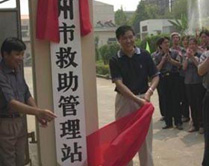
A new regulation on aid for vagrants and beggars in urban areas takes effect today and is expected to help improve the country's social security system.
The Measures on Aid and Management for Urban Vagrants and Beggars was approved by the State Council in mid-July. It aims to provide temporary shelter for the homeless in a bid to maintain social order in cities.
The new regulation was launched to replace the two-decade-old Measures for the Internment and Deportation of Urban Vagrants and Beggars.
The former holding and deportation system for vagrants and beggars in urban areas is no longer suitable for the current situation, said Zhang Shifeng, vice-director of the Social Welfare and Social Affairs Department of the Ministry of Social Affairs.
The new regulation is designed to resolve the problem of urban vagrants and beggars and to improve social relief mechanisms, Zhang told China Daily yesterday.
Four aid stations for vagrants in Beijing's Chaoyang, Fengtai, Haidian and Shijingshan districts will open to the public today, officials at the Beijing Civil Affairs Bureau said yesterday.
Under the new regulation, vagrants can receive help from these aid stations if they are unable to feed themselves, have no relatives or friends with whom they can seek refuge and if they receive no minimum living allowance.
Generally, vagrants and beggars registered at the aid stations will be able to receive a basic food ration and accommodation for up to 10 days, according to the regulation.
While the vagrants are there, station officials will try to contact the vagrants' relatives or the civil affairs departments of their place of origin to make more permanent arrangements for them.
It was previously common practice in many big cities to collect street tramps -- defined as those "who are without legal papers, nor a normal dwelling place, nor a normal means of support" -- and place them in temporary confinement before deporting them to their place of origin.
Legal experts argued that the old practice was contrary to the Chinese Constitution.
However, the new regulation highlights the principle of voluntary participation and free aid and it aims to safeguard citizens' freedom of the person as laid down in the Constitution, Zhang said.
(China Daily August 1, 2003)
|

